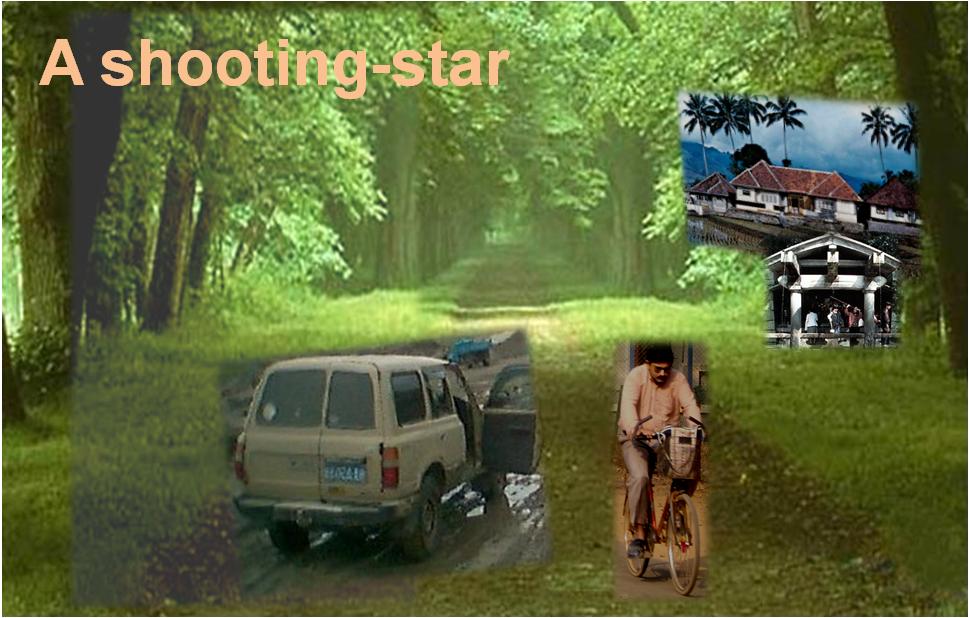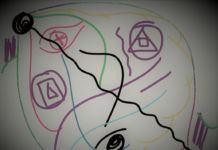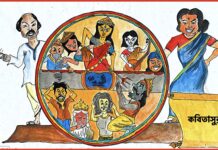On the unpaved dust-laden road a white dust-clothed car was seen early in the morning. The inescapable reddish dust was all pervading whirling from the wheels at the back. In that nondescript road out there a scene of such kind was seen quite rarely. A small group of scantily-clad children gathered. The car left the closest metalled road junction, nearly twenty-five kilometers away. The serpentine unpaved road, they were travailing for the last couple of hours, resembled the spiral Nautilus shell. They had to ask the bystanders and road-side shops from time to time, at least fifty different times since they left the district headquarter. It was around the year 1955. They were the media people. A boy of a small village somewhere out there named Moynaguri excelled in that year’s Higher Secondary Examination. The name of that boy was Jyotirmoy Mukherjee, born and brought up in a desolate small village of Southern Bengal, surrounded by thick woods. He did shine like a bright star exactly after his name. He was fondly called ‘Jyoti’ in his village.
Media people had a tough time to reach the said remote and practically unapproachable village, Moynaguri, amidst woods all-around. For the first time in the history of that village video cameras were flashed and people were interviewed. Newspapers published his brief biography and photographs appeared. The interviews were broadcasted in radio. Television wasn’t that intrinsic part and parcel of our household in those days. They took the snaps of the humble mud-house of the primary school in which he studied once. As a small boy he would come here with two or three books, a slate and a piece of brightly smocked gunnysack braced by one arm. The poverty stricken sole teacher of that school was interviewed. The emaciated face of the old teacher was lighted up hearing the news. He proudly proclaimed that he knew one day his bright student whom he adorned not less than that of his own son, would definitely come up with flying colours. Like his teacher many seniors of the village too staunchly believed that Jyoti’s achievement wasn’t a mere fortuitous one. He showed his brilliant qualities right from his children days. He tried heart and soul to achieve that result. As a boy of hardly ten years he had learned all the Sanskrit verses of the sacred ‘Bhagvat Geeta’ by heart. Whenever he would present an uninterrupted recitation, listening to that people would simply get mesmerized. On the whole he was out and away the best. He was loved by all, high and low.
He never stood second in any class. The high school in which he studied was at a distance of seven kilometers from home. Every year he would carry home a number of trophies for his excellent performance in cultural activities, sports and games too. His biography appeared both in English and Bengali dailies. He achieved milestones of success in his life literally with flying colours. He stood first once again in the university for his graduation with honours. And he already planned to do research in applied mathematics.
Almost all village folk in and around Moynaguri bewildered and dazed, “God has bestowed a man of such a stature, and he was gifted with a son like Jyoti?” Though a jaminder’s son, Jyoti’s father, learned nothing worth mentioning, except revilement and oppressing the poor people, particularly the ‘landless-lower-caste-people’ who would take care of their masters’ bovines & help in agriculture in return of some grains & paltry sum. He was in bad odour with decent people for his foul tongue. Those people were literally scared of him. He would beat any one of them severely for their slightest carelessness or negligence. In his youth he did a number of inhuman acts. The very first one was when he slapped and thrashed a small boy right and left till he fell unconscious. The boy was told to collect cowpats and clean the sheds, which he didn’t do properly. When he found the boy was unconscious, he tossed the ‘little-placid-body’ into an algal-bloom covered olive coloured small pond nearby. Two labourers thatching a mud-house a little away on the other side of the pond noticed that. They ran swiftly but couldn’t dare to shout out-of-fear. They fished out the life-less body. They told him nothing to his face. And the poor mother of that boy, a petite lady, was preparing the farmyard ground applying a plaster of soil, water and cow dung mixture. People came to know that the restless urchin was drowned accidentally. And that was it. The words were buried forever. Authorities never knew such incidents in those days and the law of the land was either not in force or not accessible at all.
Jyoti’s grandma had witnessed the next one, a violent scene indeed. The old and fragile widow was the sole spectator, when her son, Jyoti’s father, exchanged hot arguments with his first wife. She was carrying then. The quarrel aggravated. He manhandled her in such a way that she bled profusely, an unusual haemorrhage. She fainted and finally breathed her last on account of that bleeding, before the doctor could reach riding on his tonga, a light horse-drawn two-wheeled vehicle. Words did spread out of doors. People kept quiet.
He was at the end of his tether by spending lavishly. He encroached by force a few acres of productive arable land of a widow of that same village. The plot was the considerable part of her source of income to bring up her two daughters and caring ailing mother-in-law. Being a widow of the same village and having no male member in the family, her protests went in vain. And thus, she had no means left to retrieve except cursing. People forgot about it. By the time when Jyoti was in high school, upper cast families of the village the landlords of the yesteryears hardly had any income left from their ‘jamindari-estate’ but their agricultural produce only. Scores of acres of forestland and wasteland were declared as vested property by the government. Earlier people of many hamlets around Moynaguri were their subjects. Those people would pay in cash or in kind because their cattle grazed in the forests. When Jyoti passed graduation by then his father needed some heavy amount to admit his son in the most reputed university of the state. He sold that widow’s plot of arable land on the sly. The widow who was the actual heir came to know that. She grumbled and muttered on the veranda of her in-law’s incompletely built house. The poor-soul couldn’t retrieve and thus, cursed, “Wherever he spends that money which he procured selling my husband’s property would be fruitless”.
Jyoti joined the world famous university for his post-graduation studies. His brilliant career and above all his amiable nature were liked by many faculties out there. Some foreign students too developed very close friendship with him. One of them was Mizokami, a Japanese national, who was given scholarship from Yokohama University to study Indian Art and Culture out there. Another one a German girl Marita Reinsch who was doing some advance course in Sanskrit. Among all his classmates the sole competitor in true sense was a girl, the only daughter of one of the faculties of the same school-of-studies. However, Jyoti did well in studies and topped the first semester examination. And he was hand in glove with Mizokami.
Mizokami visited Moynaguri along with Jyoti. No yearbook or a similar kind had noticed it. But it was true that Mizokami was the first Japanese national who set his foot in and around the humble surroundings of Moynaguri. He was an avid learner and of course very industrious. He picked up several words of Bengali. One fine morning he was found seriously observing the modus operandi of ‘bamboo-basket-making’. Jyoti’s mother taught him the actual style of eating midday meal in Bengal. He squatted on the floor beside Jyoti and religiously learned every bit of her instructions through gestures only. Jyoti enjoyed mother’s gesticulations the most. Interesting he noticed that language seemed no barrier for a true emotional attachment. The mother within her was entranced when she found that he could successfully learn the way of eating drumstick-pieces. He could eat rice using his fingers, categorically only of right hand. He loved ‘macher jhol‘, a typical Bengali cuisine of fried fish in flavoured stew, prepared by Jyoti’s mother.
Jyoti was studying for the final semester of his masters. One day all on a sudden a man came to the village and informed his father that Jyotirmoy was admitted in a hospital for his sudden ill health. Father had to rush immediately for his son. One of his nephews accompanied. Their beloved Jyoti was hospitalized. He was treated with expensive medicines and injections. Doctors and various specialists took the help of the latest instruments for diagnosis. And it was revealed that his MRI report wasn’t normal. Doctors suspected some severe abnormality. Days passed and finally the devastating news reached Moynaguri. The poor mother could not speak anything only sobbed and finally fainted at the entrance of the arched main gate of the ancestral temple complex. Relatives gathered. The archaic surroundings of the temple precinct of the hamlet remained silent. Some commented, “It’s all over with the recent message.” But all the relatives didn’t lose heart. The best available treatment was continued for Jyoti.
Years passed. Life continued in Moynaguri. People out there were by and large farmers. They forgot many incidents. One morning a man though appearing quite smart & buxom but unusually quiet, took a dip in the taal, a large pond, where most of the villagers would bathe, before the midday meal. Some others would also prefer to take an ablution early in the morning. Before putting on the fresh and dry cloth he disrobed himself completely standing on the steps of the ghat. On seeing this act of him, a few girls giggled, because they were guests of a family. They didn’t know him.
Every member of the village knew him well. He was, by then, off his head. He was their beloved Jyoti, the bright star of their village, turned a complete insane by then. He did shine like a bright star exactly after his name ‘Jyotirmoy’ but remained invisible, unknown & nondescript very much like ‘a-shooting-star’. He would always remain unbelievably calm and quiet. And he never turned violent. He would obey every instruction of his mother. Words did spread. Relatives heaved a sigh of relief.
Every morning as he would get up, he would go for walk towards their crop-fields. He would finish his morning chores and then wait for the tea and breakfast, which his mother would hand over him. He would go to the farms, sit for some time blankly looking the working farm-helpers. He would ask his mother for a fresh cloth before going to take bath. After bath he would sit exactly in that part of the verandah where he sat every day. Every evening he would invariably come to the temple premises before the sandhya aarati would commence. The archaic surroundings of the temple precinct would mostly remain silent. On some days few audacious children would approach him for the sake of asking some mathematical problems. Without saying a word he would pick up the pen and start writing on the note book, which were advanced towards him. Some such solutions only the brilliant students could follow. Others would seek help of their friends or teachers to understand the missing steps.
Bibhuti, a father of two marriageable daughters, approached Jyoti’s mother for the marriage negotiation of Jyoti. She, the poor mother, took help and guidance from the elders of the village. The elders were her husband’s brothers, cousins or uncles and nephews. After three rounds of detail discussions the relatives finally agreed. Most people of Moynaguri were at fault and did not know what to say. Jyoti’s mother asked her in a free and easy manner, “Will you follow us in weal and woe?” Calmly the girl nodded her head positively. Aasha, the elder one agreed to do it at all hazards. She was married to Jyoti in no time. She was indeed very composed.
Even after marriage Jyoti continued his own daily routine as it was. Mother observed her daughter-in-law and found that she was quite at home with all kinds of works. She called Aasha and said, “Dear child, always remain by my side and let my son observe the same.” For five consecutive days the astute mother called her daughter-in-law to always remain by her side from dawn to dusk. Aasha would follow her at her heels while handing over his tea and breakfast, while giving a fresh cloth before he would go for his bath, while placing the plate well arranged with all items for his lunch. The newlywed Aasha religiously followed in the wake of her mother-in-law everywhere. On the sixth day Aasha was told to take the Jyoti’s food all by herself. She moved with bated breath. As the plate, the lunch, was placed before him, he looked up and enquired about the whereabouts of his mother. Without revealing her nervousness, she remained quiet for a few seconds and then politely told him that she would come soon.
Mother was observing standing behind the door pane. She came forward. With tears rolling down her cheeks she said, “Son, I am getting older, one day I’ll die but she will be there to take care of you, but remember, at all events, you must always obey her.”
While taking the first morsel, he nodded his head, very much like a overacting pampered child.
*******
[ N:B:- Please note that the following idiomatic expressions were used in the above short-story :-
time to time, heart and soul, on the whole, out and away, high and low, once again, in bad odour, right and left, to his face, in force, at all, on account of, out of doors, at the end of his tether, on the sly, above all, hand in glove, of course, all over with, by and large, off his head, for the sake of, at fault, free and easy, weal and woe, at all hazards, in no time, at home, at her heels, at all events ]
















